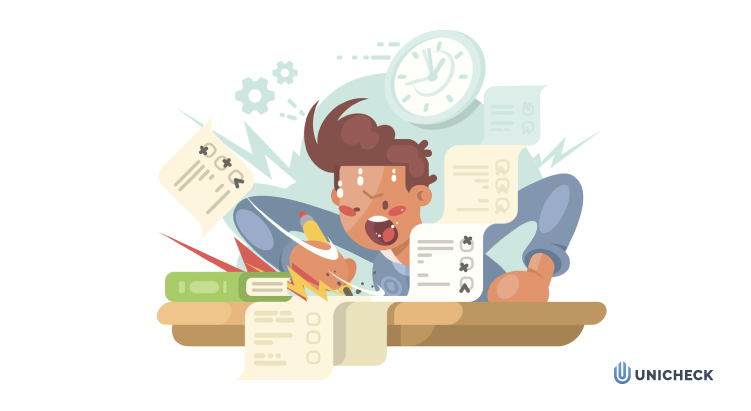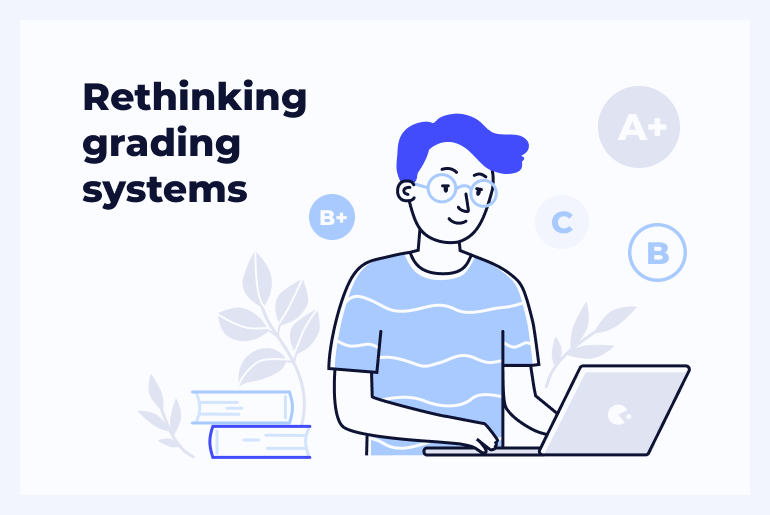There is an old saying that student’s mind is capable of learning Chinese language in one night. Such “sprinter” style of learning is kind of bravado act like eating the whole can of pasta without sauce and butter, but sometimes it is really the last chance you get the day before the exam.
Some of us entirely lean on the short-term memory, drinking the gallons of coffee and consuming tons of chocolates, while stuffing own head with new material. With a сertain level of luck, it works. If it doesn’t, you might fall short on knowledge, nerves, or space in your new sweatshirt.
We do not mean to sound pessimistic or whatnot, but it is impossible to learn everything in depth, having just a night before the exam. Still, what time you’ve got could be useful for memorizing the basics, experimenting with study methods, revealing the details not directly related to the subject, and other kinds of allnighter fun before the exam.
Unicheck uncovers the expert views of what to do the night before an exam in order to be happy the day after:
The best place ≠ most comfortable
Сlean, quiet and fresh setting is very important for learning. However, a bench in the park, cafe or even the shopping mall will do too. A smell or atmosphere can trigger certain events getting back to your memory, just like it works when you breathe in the perfume or listen to your favorite song from the past.
The only thing that should not be mixed up with learning is your bed.
Even if it seems like your “internest” is too good your mind will subconsciously associate it with sleep and rest, setting you further from learning.
Breaks are good for you
It is not desirable, it is absolutely necessary to take breaks while studying. Spread that little time you’ve got into learning intervals best for you, and make a schedule.
An example: work for an hour and a half without being distracted by anything, and then rest for 30 minutes. By the way, the further from the monitor is your rest is, the better it will be. Walk to the kitchen, drink coffee, call the same night owls as yourself. You can even go to the extremes and wash the dishes or clean up the room – the physical work relieves the overloaded brain better.
Most part is learned visually
The human brain uses 50% of its resources to analyze the information absorbed visually, allocating the rest to the other cognitive processes.
The experiment: 54 wine lovers were asked to taste several samples of wine to define which is which. The odorless red dye was mixed up with a white wine. As a result, all of the participants took the fake red brew for the actual red wine mostly memorizing the color.
Mindmapping popularizing by Tony Buzan and Edward de Bono in 1970s is a note-taking technique that utilizes this memory characteristics for memorizing. Create the mind-map that radiates your idea from the core, utilizes pictures and symbols and uses simple color coding.
Structure makes better learning
If you are familiar with the material. If you were not wasting time during semester, all that you need is to refresh the material in your memory. Begin from the questions you already know and proceed to the ones you have gaps in.
When the next topic is built on the previous one. For certain subjects like math, it is impossible to learn the new topic or perform the actions without knowing previously studied material. Exactly for this case, use the logical “from first to last” manner of studying moving from basics to complicated questions.
If you know nothing. If you know nothing about the subject, you can’t afford leaving any questions for a snack. In this case, you should allocate them in an easy way using the 3-sentence approach. In each of the question define: the problem, the main idea, the final conclusion, highlighting only 3 main theses in the question.
Such concentrated package is a perfect ground for developing thoughts, associations, logical constructions, critical thinking.
Practice is better understanding
“Tell me and I forget, teach me and I may remember, involve me and I learn.” That is the quote of Benjamin Franklin that sums up the idea of this passage.
It does not matter who you want to become – a master of mathematical analysis, a dentist or a brilliant plumber – practice is the key to understanding. That is not a call to action to go and experiment with someone’s teeth. Try solving the problems or find an application of information you learn in the real life.
Knowing how, where and why to apply information will securely fix the information in your memory.
Personal value for impersonal information
When the brain receives new information, it decides whether to keep it in a long-term memory or not, based on the number of existing relevant neural connections.
An example: some nerd has overheard that dean threatened to expel all of the students that didn’t pass the exams. This information has the meaning since the nerd knows who the dean is but this information lacks the value as he passed the exams already. If he didn’t pass the exams, the information would have had both meaning and value for him, raising the chances to be memorized.
How to deal with that? Try to find logical links between the blocks of information, use a “fairytale technique”. Need to remember the formula? Try to look at it from a different angle and read it as a word. If you can mentally link the new material to the one you studied before, it will help you learn more quickly and efficiently.
Do not detach the informational pieces apart – build them into the big picture of the world that is fitted in your brain.
In victory we trust
In the perfect reality, of course, you wouldn’t need to resort to any measures and techniques sitting with a glass of champagne (or orange juice) in one hand, a piece of the victory cake in another, knowing the finals are but a matter of the past. Now, you can even start thinking about choosing the most awesome Christmas presents.
Now you know the real way it goes with preparing for finals, when your time and energy sources are limited. The night before exam tips are extreme measures that can be your lifesaving buoy in the ocean of information and uncertainty. Enjoy the studying and get ahead to the better grades!




